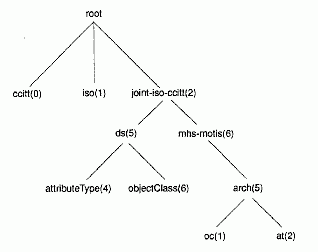
Objects in a network environment, such as DCE, require unique names to distinguish them from one another. To provide these names, object identifiers are allocated by an administrative organization, such as a standards body. An object identifier is a hierarchical sequence of numbers uniquely identifying an object. Associated with each object identifier is a character string to make it easier to document.
The possible values of object identifiers are defined in a tree. Part of this tree is shown in the following figure. It begins with three numbered branches coming from the root: branch 0 (assigned to CCITT), branch 1 (assigned to ISO), and branch 2 (a joint ISO-CCITT branch). Below each of these branches are other numbered branches assigned to various standards such as the directory service (ds(5)) and electronic mail service (mhs-motis(6)) with each ending in a named object. Thus, the name of any of these objects is a series of integers describing a path down this tree to the leaf node.
Object Identifiers

The object identifier associated with the XDS package is defined as follows:
{iso(1) identified-organization(3) icd-ecma(12) member-company(2) dec(1011) xopen(28) dsp(0)}
All object classes and object attributes in the directory service package have these numbered branches associated with them. The classes and attributes, in turn, have their own unique numbers. These object identifiers are defined in header files included as part of the XDS and XOM API software. For example, the attribute type Common-Name is identified by the object identifier 2.5.4.3.
The following table contains a sample list of object identifiers for selected attributes. The complete list is provided in Basic Directory Contents Package.
Object Identifiers for Selected Attribute Types
| Attribute Type | Object Identifier |
| Aliased-Object-Name | 2.5.4.1 |
| Business-Category | 2.5.4.15 |
| Common-Name | 2.5.4.3 |
| Country-Name | 2.5.4.6 |
| Description | 2.5.4.13 |